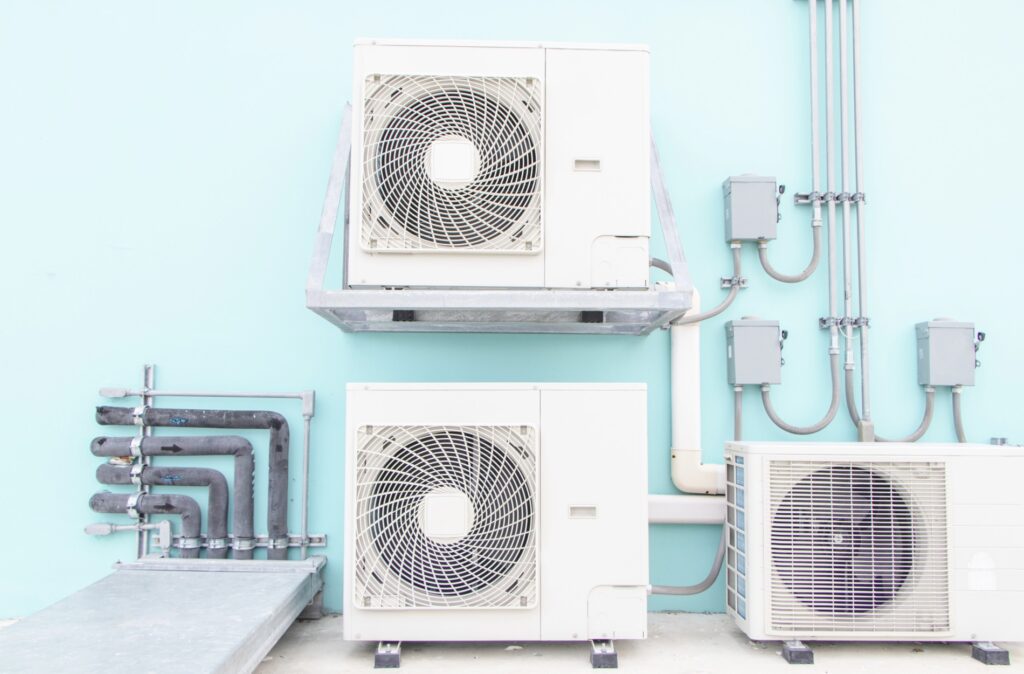As air conditioning and heating specialists, we strive to deliver a wide range of innovative and energy-efficient solutions for our clients’ residential, commercial, and new construction needs. One versatile HVAC system that has been gaining popularity is the heat pump. These systems provide both heating and cooling capabilities, making them a comprehensive and cost-effective solution for maintaining optimal indoor comfort throughout the year. In this post, we will explore the benefits of heat pumps and discuss their applications for a variety of settings.
At their core, heat pumps work by transferring heat from one area to another, as opposed to generating heat directly, like traditional furnaces or air conditioners. During the winter months, they extract heat from the outdoor air or the ground and transfer it indoors. Conversely, in the summer, they operate as air conditioners, removing heat from your indoor spaces and transferring it outside. This unique method of operation allows heat pumps to provide efficient heating and cooling while consuming less energy than traditional systems.
Types of Heat Pump Systems
There are three main types of heat pump systems, each with their own set of benefits and ideal applications. Understanding the differences between these types will help you determine which one is the best fit for your unique needs:
1. Air-source heat pumps: These are the most common type of heat pump system. They transfer heat between the indoor air and the outdoor air, using a refrigerant to facilitate the transfer process. Air-source heat pumps are suitable for most climates, particularly where the winters are relatively mild, and can provide significant energy and cost savings.
2. Ground-source or geothermal heat pumps: These systems utilize the stable ground temperatures to facilitate the transfer of heat. Pipes buried underground circulate a mixture of water and antifreeze, absorbing or dissipating heat as needed. Although geothermal systems can be more expensive upfront, they are incredibly energy-efficient, ideal for extreme climates, and can offer long-term cost savings on utility bills.
3. Absorption heat pumps: Also known as gas-fired heat pumps, these systems use a heat source like natural gas or propane to power the heat transfer process. Absorption heat pumps are less common but can be an ideal choice for locations where gas is more readily available than electricity.
Benefits of Heat Pump Systems
In addition to their versatility in providing both heating and cooling, heat pump systems offer a range of benefits, including:
1. Energy efficiency: Heat pumps consume less energy compared to traditional heating systems because they simply transfer heat rather than generating heat. This can result in reduced utility bills and a lower carbon footprint.
2. Consistent comfort: Heat pumps provide even, consistent temperatures throughout your space, avoiding the temperature swings that can be common with some other heating systems.
3. Lower maintenance needs: With fewer mechanical components, heat pumps generally require less maintenance and have a longer life expectancy compared to combustion-based heating systems.
4. Reduced safety risks: As heat pumps do not rely on fuel combustion, there is no risk of carbon monoxide poisoning or gas leaks, making them a safer option for your home or business.
Heat Pump System Maintenance and Efficiency
To ensure that your heat pump system operates efficiently and effectively, regular maintenance is crucial. Some essential maintenance tasks include:
1. Cleaning or replacing air filters: Dirty or clogged filters restrict airflow and reduce the efficiency of your heat pump. Regularly inspecting and cleaning or replacing filters as needed will help to maintain optimal performance.
2. Cleaning coils and outdoor units: The indoor and outdoor coils of a heat pump system can become dirty over time, reducing the system’s ability to transfer heat effectively. Cleaning the coils and removing debris from the outdoor unit will help to keep your heat pump operating efficiently.
3. Inspecting and sealing ductwork: If your heat pump is connected to ductwork, it’s essential to check for leaks or damage that can reduce system efficiency. Sealing any leaks and insulating ducts can significantly improve the overall performance of your heat pump system.
4. Scheduling regular professional maintenance: Having a professional technician periodically inspect and service your heat pump system will help to identify any potential issues or inefficiencies, ensuring that your system continues to run optimally.
Investing in a Heat Pump System
If you are considering installing a heat pump system in your residential, commercial, or new construction space, several factors will influence your decision:
1. Climate: The climate of your location plays a significant role in determining the type and size of the heat pump system that will best suit your needs. A qualified technician can help you choose a system tailored to your specific climate.
2. Size and capacity: It’s essential to select the right-sized heat pump for your space to ensure maximum efficiency and performance. A professional technician will carry out a load calculation, considering factors such as insulation, square footage, and sun exposure to determine the appropriate system size.
3. Installation: Proper installation and integration with existing HVAC equipment are critical to the success of your heat pump system. A professional technician will advise on the most suitable location for the indoor and outdoor components and ensure that the system is set up correctly for optimum efficiency.
Conclusion
Heat pumps provide a versatile and energy-efficient heating and cooling solution for a variety of applications in residential, commercial, and new construction settings. By understanding the different types and benefits of heat pump systems, you can make an informed decision about whether this innovative technology is the right fit for your unique needs.
Count on our experienced professionals at Cool Tech Mechanical to guide you through the process of selecting, installing, and maintaining a heat pump system that delivers year-round comfort and energy savings for your home or business. Contact our HVAC company in Arlington, TX today to learn more about how heat pumps can revolutionize the way you heat and cool your space.







